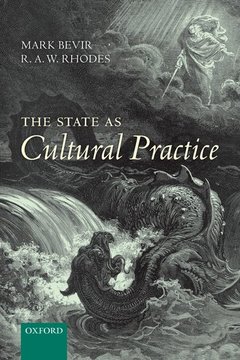Description
The State as Cultural Practice
Authors: Bevir Mark, Rhodes R. A. W.
Language: English
Subject for The State as Cultural Practice:
The State as Cultural Practice
Publication date: 04-2015
258 p. · 15.7x23.1 cm · Paperback
Publication date: 04-2015
258 p. · 15.7x23.1 cm · Paperback
The state as cultural practice (hardback)
Publication date: 04-2010
260 p. · 16.1x24.1 cm · Hardback
Publication date: 04-2010
260 p. · 16.1x24.1 cm · Hardback
Description
/li>Contents
/li>Biography
/li>
The State as Cultural Practice offers a fully worked out account of the authors' distinctive interpretive approach to political science. It challenges the new institutionalism, probably the most significant present-day strand in both American and British political science. It moves away from such notions as 'bringing the state back in', 'path dependency' and modernist empiricism. Instead, Bevir and Rhodes argue for an anti-foundational analysis, ethnographic and historical methods, and a decentred approach that rejects any essentialist definition of the state and espouses the idea of politics as cultural practice. The book has three aims: · to develop an anti-foundational theory of the state · to develop a new research agenda around the topics of rule, rationalities, and resistance · by exploring empirical shifts and debates about the changing nature of the state to show how anti-foundational theory leads us to see them differently. Bevir and Rhodes argue for the idea of 'the stateless state' or the state as meaning-in-action. So, the state is neither monolithic nor a causal agent. It consists solely of the contingent actions of specific individuals; of diverse beliefs about the public sphere, about authority and power, which are constructed differently in contending traditions. Continuity and change are products of people inheriting traditions and modifying them in response to dilemmas. A decentred approach explores the limits to the state and seeks to develop a more diverse view of state authority and its exercise. In short, political scientists need to bring people back in to the study of the state.
List of Figures and Tables. Preface and acknowledgements. 1. Introduction. Part I State theory. 2. Institutionalism. 3. Anti-foundationalism. 4. Interpretation. 5. Rethinking the state. Part II Rule, Rationalities, and Resistance. 6. Ministerial ruling. 7. Managerial rationalities. 8. Living Westminster Traditions. 9. Bringing people back in. Conclusions. Bibliography. Index.
Mark Bevir is a Professor of Political Science at the University of California, Berkeley. Earlier he received a doctorate from Oxford University, and held academic appointments at the University of Madras (India) and the University of Newcastle (UK). He is the author of The Logic of the History of Ideas (1999) and New Labour (2005). Rod Rhodes holds a joint appointment as Professor of Government in the School of Government at the University of Tasmania and Distinguished Professor of Political Science at the Australian National University. He is also Professor Emeritus of Politics at the University of Newcastle (UK). He is the former Research Director of the UK Economic and Social Research Council's 'Whitehall Programme' (1994-1999); and of the Research School of Social Sciences at the Australian National University (2007-8). He is the author or editor of some 30 books including recently; Comparing Westminster (joint author 2009); Observing Government Elites: up close and personal (joint editor, 2007); The Oxford Handbook of Political Institutions (joint editor, 2006). He has been editor of Public Administration since 1986. He is Treasurer of the Australasian Political Studies Association.
© 2024 LAVOISIER S.A.S.




